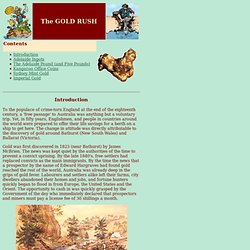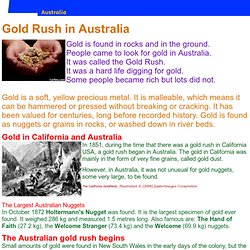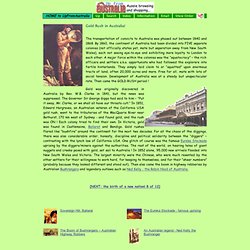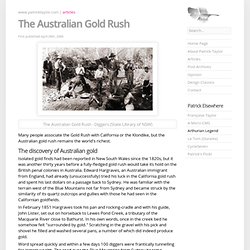

The I Files - Gold Rushes (Australia) Australian Gold Rush Event. The Gold Rush. Introduction To the populace of crime-torn England at the end of the eighteenth century, a 'free passage' to Australia was anything but a voluntary trip.

Yet, in fifty years, Englishmen, and people in countries around the world were prepared to offer their life savings for a berth on a ship to get here. The change in attitude was directly attributable to the discovery of gold around Bathurst (New South Wales) and Ballarat (Victoria). Gold was first discovered in 1823 (near Bathurst) by James McBrien. The news was kept quiet by the authorities of the time to prevent a convict uprising. The transformation from penal settlement to mining boom reflected the attitudes of the people - hopelessness and despair replaced by opportunity and the prospect of riches. Gold was soon discovered at Clunes and then at Ballarat. The Gold Rush opened new roads inland, attracted immigrants and injected much needed cash into the economy. Adelaide Ingots Sir Henry felt safe.
The Adelaide Pound (and Five Pounds) Australian gold rushes. An Australian gold diggings circa 1855 After the California gold rush began in 1848, causing many people to leave Australia for California to look for gold there, the New South Wales government rethought its position, and sought approval from the Colonial Office in England to allow the exploitation of the mineral resources and also offered rewards for the finding of payable gold.[2] The first gold rush in Australia began in May 1851 after prospector Edward Hargraves claimed to have discovered payable gold near Bathurst, at a site he called Ophir.[3] Hargraves had been to the Californian goldfields and had learned new gold prospecting techniques such as panning and cradling.

Hargraves was offered a reward by both the Colony of New South Wales and the Colony of Victoria. Before the end of the year, the gold rush had spread to many other parts of the state where gold had been found, not just to the west, but also to the south and north of Sydney.[4] Pre-rush gold finds[edit] F. At E. Gold! Gold Rush in Australia Gold is found in rocks and in the ground.

People came to look for gold in Australia. It was called the Gold Rush. It was a hard life digging for gold. Some people became rich but lots did not. ~ GOLD ~ Gold Rush in Australia! The transportation of convicts to Australia was phased out between 1840 and 1868.

By 1860, the continent of Australia had been divided into FIVE separate colonies (not officially states yet, mate but seperation away from New South Wales), each not seeing eye-to-eye and exhibiting more loyalty to London to each other. A major force within the colonies was the “squatocracy” – the rich officers and settlers a.k.a. opportunists who had followed the explorers into fertile hinterlands. They simply laid claim to or “squatted” upon enormous tracts of land, often 20,000 acres and more.
Free for all, mate with lots of social tension. Development of Australia was at a steady but unspectacular rate. Gold was originally discovered in Australia by Rev. [NEXT: the birth of a new nation! The Australian Gold Rush. Www.patricktaylor.com | articles First published April 28th, 2006 The Australian Gold Rush - Diggers (State Library of NSW) Many people associate the Gold Rush with California or the Klondike, but the Australian gold rush remains the world's richest.

The discovery of Australian gold Isolated gold finds had been reported in New South Wales since the 1820s, but it was another thirty years before a fully-fledged gold rush would take its hold on the British penal colonies in Australia. In February 1851 Hargraves took his pan and rocking-cradle and with his guide, John Lister, set out on horseback to Lewes Pond Creek, a tributary of the Macquarie River close to Bathurst. Word spread quickly and within a few days 100 diggers were frantically tunnelling for instant wealth. Edward Hargraves did not make a fortune from gold.
The discovery in New South Wales and the resulting rush of labour from the adjoining state of Victoria prompted the Governor of Victoria, Charles J. GoldRush.